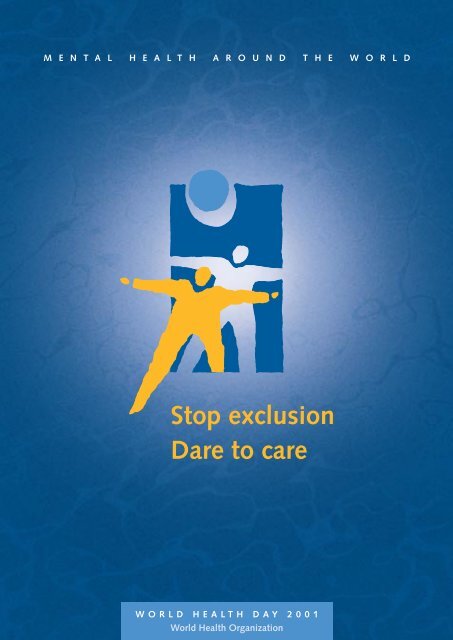Stop exclusion Dare to care - World Health Organization
Stop exclusion Dare to care - World Health Organization
Stop exclusion Dare to care - World Health Organization
You also want an ePaper? Increase the reach of your titles
YUMPU automatically turns print PDFs into web optimized ePapers that Google loves.
M E N T A L H E A L T H A R O U N D T H E W O R L D<br />
<strong>S<strong>to</strong>p</strong> <strong>exclusion</strong><br />
<strong>Dare</strong> <strong>to</strong> <strong>care</strong><br />
WORLD HEALTH DAY 2001<br />
<strong>World</strong> <strong>Health</strong> <strong>Organization</strong>
FOREWORD<br />
Pho<strong>to</strong>: © WHO, Anenden<br />
Address by Dr Gro Harlem Brundtland<br />
Direc<strong>to</strong>r-General of the<br />
<strong>World</strong> <strong>Health</strong> <strong>Organization</strong><br />
Pho<strong>to</strong>: © WHO, A.S. Kochar<br />
On 7 April 2001, all peoples<br />
and governments<br />
around the world will<br />
observe <strong>World</strong> <strong>Health</strong><br />
Day. This year is devoted<br />
<strong>to</strong> mental health. We<br />
focus on mental health in recognition<br />
of the burden that mental and brain<br />
disorders pose on people and families<br />
affected by them, and with the aim <strong>to</strong><br />
highlight the important advances<br />
made by researchers and clinicians in<br />
reducing suffering and the accompanying<br />
disability. Our message is one of<br />
concern and hope.<br />
The road ahead is long. It is littered<br />
with myths, secrecy and shame. Rare<br />
is the family that will be free from an<br />
encounter with mental disorders or<br />
will not need assistance and <strong>care</strong> over<br />
a difficult period. Yet, we feign ignorance<br />
or actively ignore this fact. This<br />
may be because we do not have sufficient<br />
data <strong>to</strong> begin addressing the<br />
problem. In other words, we do not<br />
know how many people are not getting<br />
the help they need – help that is<br />
available, help that can be obtained at<br />
no great cost. And, because we lack<br />
this knowledge, we have not done<br />
well <strong>to</strong> address mental and brain disorders.<br />
As we fail <strong>to</strong> acknowledge this<br />
reality, we perpetuate a vicious cycle<br />
of ignorance, suffering, destitution<br />
and even death. We have the capacity<br />
– within us – <strong>to</strong> tackle the next frontier.<br />
Within people, within societies,<br />
within governments. Together we<br />
have <strong>to</strong> work <strong>to</strong> make the change.<br />
An estimated 400 million people alive<br />
<strong>to</strong>day suffer from mental or neurological<br />
disorders or from psychosocial<br />
problems such as those related <strong>to</strong><br />
alcohol and drug abuse. Many of<br />
them suffer silently. Many of them<br />
suffer alone. Beyond the suffering and<br />
beyond the absence of <strong>care</strong> lie the<br />
frontiers of stigma, shame, <strong>exclusion</strong><br />
and, more often than we <strong>care</strong> <strong>to</strong><br />
know, death.<br />
The simple truth is that we have the<br />
means <strong>to</strong> treat many disorders. We<br />
have the means and the scientific<br />
knowledge <strong>to</strong> help people with their<br />
suffering. Governments have been<br />
remiss in that they have not provided<br />
adequate means of treatment <strong>to</strong> their<br />
people. And people have continued <strong>to</strong><br />
discriminate against those that suffer<br />
from these disorders. Human rights<br />
violations in mental hospitals, insufficient<br />
provision of community mental<br />
health services, unfair insurance<br />
schemes and discrimina<strong>to</strong>ry hiring<br />
practices are only some of the examples.<br />
By accident or by design, we are<br />
all responsible for this situation <strong>to</strong>day.<br />
The time for reckoning is now. Let us<br />
look at this day as an opportunity and<br />
a challenge. A day <strong>to</strong> reflect upon<br />
what remains <strong>to</strong> be done and how we<br />
can do it. Let us use this day and the<br />
weeks ahead <strong>to</strong> take s<strong>to</strong>ck and advocate<br />
for policy changes on the one<br />
hand and attitude changes on the<br />
other. Together with our Member<br />
States, let us pledge <strong>to</strong> work <strong>to</strong>wards<br />
a day when good health will also<br />
mean good mental health.<br />
This past century has seen spectacular<br />
changes in the way we live and think.<br />
Human brilliance and technology have<br />
come <strong>to</strong>gether <strong>to</strong> propose solutions<br />
we dared not imagine fifty years ago.<br />
We have conquered diseases that<br />
once seemed insurmountable. We<br />
have saved millions of people from<br />
premature death and disability. And<br />
our search for better solutions <strong>to</strong><br />
health is, as it should be, ceaseless.<br />
The solutions <strong>to</strong> mental health problems<br />
are not difficult <strong>to</strong> find; many of<br />
them are already with us. What we<br />
need is <strong>to</strong> focus on this as a basic<br />
necessity. We must include solutions<br />
and <strong>care</strong> for mental health in our<br />
search for a better life for all in a<br />
systematic way. Only then will our<br />
successes be more meaningful.<br />
On this day, we must commit <strong>to</strong><br />
“<strong>S<strong>to</strong>p</strong> <strong>exclusion</strong> – dare <strong>to</strong> <strong>care</strong>.”
CONTENTS<br />
INTRODUCTION<br />
Introduction<br />
Myths hurt – face them<br />
Facts help – use them<br />
Mental health is an integral component<br />
of health through which a person<br />
realizes his or her own cognitive,<br />
affective and relational abilities. With<br />
a balanced mental disposition, one is<br />
more effective in coping with the<br />
stresses of life, can work productively<br />
and fruitfully, and is better able <strong>to</strong><br />
make a positive contribution <strong>to</strong> his or<br />
her community. Mental and brain disorders,<br />
by affecting mental health,<br />
impede or diminish the possibility <strong>to</strong><br />
reach all or part of the above. Preventing<br />
and treating them clears the<br />
road <strong>to</strong> achieving one’s full potential.<br />
As mental health is a fundamental<br />
building block for human development,<br />
we must face the facts that<br />
mental health problems are a part of<br />
life, that they can arise and that they<br />
can be addressed.<br />
<strong>S<strong>to</strong>p</strong> Exclusion<br />
There is no justification in ethics, science<br />
or society <strong>to</strong> exclude persons<br />
with a mental illness or a brain disorder<br />
from our communities. There is<br />
room for everyone.<br />
The health <strong>care</strong> system can lead the<br />
way. No rationale exists for excluding<br />
mental health services from the general<br />
health <strong>care</strong> system. Parity<br />
between physical and mental health<br />
is vital.<br />
Mental health <strong>to</strong>day<br />
A vision for the future<br />
Where <strong>to</strong> learn more<br />
<strong>Dare</strong> <strong>to</strong> Care<br />
Don’t fear those experiencing a mental<br />
illness. It can happen <strong>to</strong> anyone.<br />
Don’t ignore early warning signs.<br />
<strong>Dare</strong> <strong>to</strong> challenge the myths and the<br />
misconceptions.<br />
Provide better <strong>care</strong>; ensure access <strong>to</strong><br />
<strong>care</strong>, insist on equity in <strong>care</strong>. All this<br />
must be done and all this is possible if<br />
we dare <strong>to</strong> believe that mental health<br />
<strong>care</strong> is a basic health concern for all.
MYTHS HURT – FACE THEM<br />
MYTHS HURT – FACE THEM<br />
Do mental and brain disorders only<br />
affect adults in rich countries?<br />
No. All are affected – children and adults,<br />
rich and poor.<br />
Are mental and brain disorders just<br />
a figment of one’s imagination ?<br />
No. They are real illnesses that cause<br />
suffering and disability.<br />
Number of persons world-wide with<br />
epilepsy (yellow) and schizophrenia (blue)<br />
(in millions)<br />
Source: The International League<br />
Against Epilepsy (ILAE) 1999<br />
Mental and brain disorders<br />
affect adults, elderly,<br />
children and adolescents<br />
Approximately one in five of the<br />
world’s youth (15 years and younger)<br />
suffer from mild <strong>to</strong> severe disorders. A<br />
large number of these children remain<br />
untreated as services simply do not<br />
exist. The majority of treatments have<br />
been traditionally geared <strong>to</strong> adult<br />
patients, ignoring the need for early<br />
intervention in childhood.<br />
■ Some 17 million young persons in<br />
the 5-17 age group in Latin America<br />
and the Caribbean are affected<br />
by mental or brain disorders severe<br />
enough <strong>to</strong> require treatment.<br />
7<br />
7.5<br />
Developed Countries<br />
38<br />
37.5<br />
Developing Countries<br />
■ A study has shown that 10% of<br />
school children in Alexandria, Egypt<br />
suffer from depression. Anxiety<br />
among the secondary-level school<br />
children in their final year of school<br />
was found <strong>to</strong> reach 17% in this<br />
study.<br />
Mental and brain disorders<br />
are a concern for both<br />
developed and developing<br />
countries<br />
No nations and no peoples are spared:<br />
■ In a landmark WHO study in 27<br />
developing and developed countries,<br />
no population has been found<br />
<strong>to</strong> be free of schizophrenia.<br />
No one is immune.<br />
■ Alcohol abuse is another common<br />
disorder that knows no boundaries.<br />
For example, in Russia, 35,000 people<br />
die every year from fatal alcohol<br />
poisoning.<br />
■ Epilepsy is universal and more<br />
frequent in developing countries<br />
■ A recent survey in a rural Pakistani<br />
village concluded that 44% of the<br />
adults were affected by depressive<br />
disorders.<br />
Pho<strong>to</strong>: © WHO, C. Gaggero<br />
“Pull yourself up – it's all in your<br />
imagination.” How often have we<br />
heard that? It’s not just friends and<br />
family that fail <strong>to</strong> grasp the existence<br />
of a mental disorder. Even governments<br />
choose ignorance, as seen by<br />
the fact that mental health is often<br />
excluded from their health priorities<br />
and plans.<br />
Mental disorders are real<br />
Mental illnesses and brain disorders<br />
provoke suffering, cause disability and<br />
can even shorten life as we see from<br />
episodes of depression after a heart<br />
attack, numbers of liver disease resulting<br />
from alcohol dependence or cases<br />
of suicide. The existence of mental<br />
and brain disorders often remains hidden,<br />
voluntarily by the patient or simply<br />
unrecognized as a real illness by<br />
the person and their family. Yet the<br />
underlying abnormal substructure of<br />
many disorders has been identified by<br />
images of the brain. Thus <strong>to</strong> ignore<br />
their existence is akin <strong>to</strong> denying that<br />
cancer exists because we are unable<br />
<strong>to</strong> see the abnormal cells without a<br />
microscope. Mental illnesses can be<br />
diagnosed and treated before it is <strong>to</strong>o<br />
late.<br />
The symp<strong>to</strong>ms are a sign of<br />
real illness<br />
There are people who suffer from<br />
overwhelming fears that are accompanied<br />
by a host of recognizable symp<strong>to</strong>ms.<br />
Others grapple with constant<br />
negative or unpleasant thoughts and<br />
turn <strong>to</strong> alcohol <strong>to</strong> escape. In some<br />
cases, the patient’s pain can be so<br />
excruciating that suicide is seen as a<br />
relief. In the year 2000, there will<br />
have been an estimated one suicide<br />
death every 40 seconds.<br />
It is easy <strong>to</strong> ignore or dismiss many<br />
symp<strong>to</strong>ms, yet the fact is that five out<br />
of the ten most disabling disorders are<br />
psychiatric in nature. Unipolar depression,<br />
alcohol use, bipolar affective<br />
disorder (manic-depression),<br />
schizophrenia and obsessive-compulsive<br />
disorder are among the 10 leading<br />
causes of disability world-wide in<br />
1990. The disability associated with<br />
mental or brain disorders s<strong>to</strong>ps people<br />
from working and engaging in other<br />
creative activities, e.g., a mother may<br />
cease caring for a baby, an adolescent<br />
may s<strong>to</strong>p socializing with peers, and<br />
an elderly person may no longer take<br />
<strong>care</strong> of himself or herself.<br />
“If someone has a broken arm, you feel sorry for them. But when<br />
(the problem is) psychiatric, people don’t know how <strong>to</strong> react because<br />
they can’t see anything. But just because you can’t see someone’s pain,<br />
”<br />
it doesn’t mean they don’t need your <strong>care</strong> and support.<br />
Samoan woman, manic depressive, 29 years old, Auckland, New Zealand<br />
Pho<strong>to</strong>: © UNHCR, A. Hollmann
MYTHS HURT – FACE THEM<br />
MYTHS HURT – FACE THEM<br />
Is it impossible <strong>to</strong> help someone with<br />
a mental or brain disorder?<br />
No. Treatments exist and <strong>care</strong>givers<br />
can be assisted.<br />
Are mental or brain disorders brought<br />
on by a weakness in character?<br />
No. They are caused by biological,<br />
psychological and social fac<strong>to</strong>rs.<br />
Counselor meets with a mother and her<br />
mentally impaired child during a<br />
counseling session in a community health<br />
center<br />
Something can be done<br />
for all mental and<br />
neurological disorders<br />
Some people recover completely. Others<br />
have a more difficult time. But in<br />
all cases, there can be an alleviation of<br />
suffering through different methods.<br />
For example,<br />
■ Schizophrenia, a severe disorder, is<br />
treatable. People suffering from<br />
schizophrenia can be helped with<br />
medication <strong>to</strong> reduce the symp<strong>to</strong>ms.<br />
A relapse can be prevented<br />
with psychosocial interventions<br />
aimed at the family, for the benefit<br />
of all.<br />
■ Most recently diagnosed children<br />
and adults with epilepsy could have<br />
a complete control of seizures for<br />
many years, provided they receive<br />
appropriate medicines.<br />
■ Rehabilitation measures, aimed at<br />
enhancing social and personal skills,<br />
assist persons with depression <strong>to</strong><br />
regain a normal life. Anti-depressant<br />
medication can also help in<br />
many cases.<br />
Help can be found from the medical<br />
profession on two levels.<br />
The general health workers, such as<br />
physicians and nurses, are the first<br />
professionals whom one could consult.<br />
Most communities have access <strong>to</strong><br />
them but in some parts of the world,<br />
they are not prepared <strong>to</strong> address the<br />
emotional needs of their patients.<br />
With proper training and supervision<br />
these professionals could be better<br />
equipped <strong>to</strong> identify and provide<br />
effective treatment for mental and<br />
brain disorders. A major stumbling<br />
block is <strong>to</strong> lift the shame so that people<br />
will talk freely of their emotional<br />
problems with their family doc<strong>to</strong>r.<br />
The specialized health workers,<br />
including psychologists, psychiatrists<br />
(for mental disorders) and neurologists<br />
(for brain disorders), psychiatric and<br />
neurological nurses, social workers<br />
and occupational therapists provide<br />
expert <strong>care</strong> where available.<br />
It is not enough <strong>to</strong> assist<br />
only the suffering person<br />
The family, which constitutes the main<br />
support system, needs support as well<br />
<strong>to</strong> preserve its functioning and wellbeing.<br />
Such help is seldom received;<br />
more services for families need <strong>to</strong> be<br />
developed in all countries.<br />
Pho<strong>to</strong>: © PAHO, A. Waak<br />
“You could get over it if you really<br />
tried.” How often is this said? Yet, it is<br />
not a question of willpower or effort<br />
alone. In some cultures, people may<br />
also consider that “immoral”<br />
behaviour or bad fate are responsible<br />
for mental health problems. Let us not<br />
simply blame the person or poor luck<br />
but try <strong>to</strong> understand the complexities<br />
of a mental or brain disorder.<br />
Extreme poverty,<br />
war and<br />
displacement can<br />
influence the<br />
onset, severity<br />
and duration of<br />
mental disorders.<br />
Research is being<br />
conducted <strong>to</strong> determine the<br />
genetic origins or<br />
biological fac<strong>to</strong>rs of<br />
various disorders<br />
Genes have been shown <strong>to</strong> be associated<br />
with the origin of schizophrenia<br />
and Alzheimer’s Disease. Depression is<br />
known <strong>to</strong> be associated with changes<br />
“Mental illness is one of the major afflictions of mankind that has<br />
had little support in the past. During the last half century there has been<br />
quite a revolution in the understanding and treatment of major mental<br />
illness such as depression, schizophrenia, manic depression and anxiety.<br />
Rather than a flaw in character or a consequence of a dysfunctional family,<br />
recent research has shown that mental illness has biological<br />
Julius Axelrod, 1970 Nobel Prize for Medicine in a letter <strong>to</strong><br />
WHO Direc<strong>to</strong>r-General on 30 June 2000<br />
roots.”<br />
Pho<strong>to</strong>: © WHO/WPRO, M. Murray-Lee<br />
Pho<strong>to</strong>: © UNHCR, C. Sattlberger<br />
in brain chemicals. Alcohol dependence,<br />
often branded as a vice resulting<br />
from poor moral character, is now<br />
linked <strong>to</strong> both the social environment<br />
and <strong>to</strong> genes. Mental retardation provides<br />
another example. One biological<br />
cause of this disorder is the lack of<br />
iodine, vital for brain development, in<br />
the diet of a growing child.<br />
Social influences can<br />
significantly contribute <strong>to</strong><br />
the development of various<br />
disorders<br />
For example, individuals react differently<br />
<strong>to</strong> stressful situations. Loss of a<br />
loved one can potentially lead <strong>to</strong> a<br />
depression. Loss of work is associated<br />
with heavy alcohol use, suicide and<br />
depression. Poor nurturing environments,<br />
whether they are the result of<br />
broken families or violence in the<br />
home or community, can result in an<br />
increased risk of mental illness.<br />
In some places of the world, mental<br />
illnesses are thought <strong>to</strong> be caused by<br />
evil spirits. This is a difficult issue. It<br />
pits faith against fact, faith healers<br />
against doc<strong>to</strong>rs, cultural beliefs against<br />
scientific knowledge. Perhaps <strong>to</strong> prevent<br />
a situation from taking a turn for<br />
the worse, mental health professionals<br />
can work with healers so that those<br />
who cannot be helped by traditional<br />
medicine can receive conventional<br />
treatments. Mental health professionals<br />
serve the community better by<br />
understanding the cultural and social<br />
context within which their work is <strong>to</strong><br />
be carried out.
MYTHS HURT – FACE THEM<br />
MYTHS HURT – FACE THEM<br />
Should we just lock up persons with<br />
mental illness ?<br />
NO. People with mental illness can<br />
function and should not be isolated<br />
or restricted.<br />
Pho<strong>to</strong>: © WHO, A.S. Kochar<br />
Is this what we want ?<br />
The treatment of mental illness is most<br />
often associated with mental hospitals.<br />
Institutions that violate basic<br />
human rights, stripping one's dignity<br />
through inhumane <strong>care</strong> still exist<br />
<strong>to</strong>day. Too often abandonment, confinement,<br />
or isolation can be seen as<br />
the only solution when confronted<br />
with an ill person. Yet, the facts show<br />
us that persons suffering from a mental<br />
illness or a brain disorder can<br />
improve and contribute <strong>to</strong> society.<br />
Pho<strong>to</strong>: © CICR, C. Chiacchiari<br />
We have seen there are many possible<br />
treatments available; there are also<br />
better and more appropriate conditions<br />
in which we can provide these<br />
treatments.<br />
Today, the picture in the world is far<br />
from perfect, but <strong>care</strong> is now available<br />
in a variety of environments.<br />
People’s own homes, clinics, emergency<br />
rooms, psychiatric wards in general<br />
hospitals and day <strong>care</strong> centers are all<br />
viable options. Rehabilitation is carried<br />
out in hostels, cooperatives, sheltered<br />
workshops and through social support<br />
groups.<br />
Like physical disorders, mental and<br />
brain disorders vary in severity. There<br />
are those that are:<br />
■ transient (like an acute stress disorder);<br />
■ periodic (like bipolar disorder, characterized<br />
by periods of exaggerated<br />
elation followed by periods of<br />
depression);<br />
■ long lasting and progressive (like<br />
Alzheimer’s Disease).<br />
Treatment must be appropriate <strong>to</strong> the<br />
disorder, and take in<strong>to</strong> account the<br />
individual’s situation: is the person<br />
alone at home? Does he/she have<br />
family who could provide <strong>care</strong> <strong>to</strong>gether<br />
with the doc<strong>to</strong>r or a nurse? The<br />
best alternative will depend on each<br />
individual, and in any situation, the<br />
human rights of people must be preserved.<br />
“I experienced homelessness at one stage coming out of the hospital.<br />
I had nowhere <strong>to</strong> go. I had no other choice. My family at that point was<br />
struggling with their own view of my condition and there was no place in<br />
the family for me. If my family had been educated, taught how <strong>to</strong> help me,<br />
supported and helped, then my s<strong>to</strong>ry would be very different. Families need<br />
”<br />
<strong>to</strong> be involved – they are after all the ones we rely on the most.<br />
Woman with a schizophrenic disorder, 43 years old, New Zealand<br />
There are many other misconceptions<br />
about mental illness and brain disorders.<br />
To address them all here would<br />
be well beyond the scope of this<br />
brochure. Take the time <strong>to</strong> explore<br />
your own personal prejudices and<br />
unfounded beliefs.<br />
We should all recognize that persons<br />
with mental illness suffer not only on<br />
account of their illness. They are often<br />
socially stigmatised, if not condemned.<br />
In everyday life, this impedes<br />
that people:<br />
■ reintegrate fully in<strong>to</strong> society, obtain<br />
decent housing, a paying job or a<br />
reasonable social life. For a person<br />
who has been discharged from a<br />
psychiatric hospital, such <strong>exclusion</strong><br />
may lead him back <strong>to</strong> the hospital;<br />
■ go for treatment when necessary,<br />
for fear that the search for help be<br />
known <strong>to</strong> others causing a loss of<br />
social status <strong>to</strong> both the person or<br />
the family. This is a serious problem<br />
since suffering is not relieved and<br />
functioning or quality of life may be<br />
affected as the disorder continues.<br />
The myths surrounding mental health<br />
problems are responsible for terrible<br />
shame and contribute <strong>to</strong> the low levels<br />
of treatment.<br />
“I am the main <strong>care</strong>-giver for my husband’s brother, who is<br />
schizophrenic. The families of the mentally ill … need <strong>to</strong> know that they are<br />
not <strong>to</strong> blame for the illness that has <strong>to</strong>rn their family apart. Shame and fear<br />
build walls of silence. Now is the time <strong>to</strong> speak out so that families can<br />
know that they are not alone, that they have nothing <strong>to</strong> be ashamed of. The<br />
public must be educated <strong>to</strong> recognize symp<strong>to</strong>ms, <strong>to</strong> know that mental illness<br />
”<br />
can strike anywhere and <strong>to</strong> understand that help is available.<br />
Mrs. Kathy Esquivel,<br />
wife of former Prime Minister of Belize, Central America
FACTS HELP – USE THEM<br />
FACTS HELP – USE THEM<br />
Schizophrenia<br />
What is it?<br />
Schizophrenia is characterized by profound<br />
disruption in thinking and feelings,<br />
affecting language, thought,<br />
perception, and sense of self. It often<br />
includes psychotic experiences such as<br />
hearing voices or holding fixed abnormal<br />
beliefs, known as delusions.<br />
How many suffer?<br />
Around 45 million persons world-wide<br />
above the age of 18 suffer from<br />
schizophrenia at some point in their<br />
lives. The disorder has been found in<br />
all nations where studies have been<br />
conducted. It begins at a young age<br />
and can impair functioning causing<br />
the loss of an acquired ability (i.e., not<br />
being able <strong>to</strong> gain one's own livelihood<br />
or disruption of studies).<br />
What can be done?<br />
Research has advanced the understanding<br />
of the disorder and made<br />
major contributions <strong>to</strong> the treatment.<br />
Treatments are both of a biological<br />
nature (e.g. medication) as well as<br />
psychosocial (e.g. psycho education of<br />
the family and rehabilitation). The<br />
helplessness of the past has been<br />
replaced by considerable hope since<br />
conditions that once were treated in<br />
12.7<br />
11.9<br />
4.5<br />
6.5<br />
closed institutions have been giving<br />
room <strong>to</strong> interventions at home, in<br />
community services, general hospitals<br />
and hostels. Psychosocial rehabilitation<br />
has made considerable strides and<br />
has enabled patients <strong>to</strong> find a place in<br />
the workforce, in their families and<br />
communities. Early treatment is essential<br />
for better recovery.<br />
5.9<br />
“My first-born son, <strong>to</strong>day aged 39, was first hospitalized at age<br />
17 for about four months, some four years after his mother died of cancer.<br />
The official diagnosis of schizophrenia was disclosed <strong>to</strong> me only five<br />
years after its onset.<br />
“For about ten years while at home, my son refused <strong>to</strong> take medication<br />
due <strong>to</strong> adverse side effects, refused <strong>to</strong> see doc<strong>to</strong>rs leading <strong>to</strong> extreme<br />
confrontations. For the last five years he is being treated with medication<br />
and his condition has stabilized. He now lives in a very decent hostel<br />
[half way home] and works in supervised employment for few hours<br />
every working day. His social life and personal relations are much<br />
improved.<br />
“Beyond the personal saga, I gained extensive experience in the last<br />
years. I am involved as member – and recently as chairman – of a family<br />
organization. I strongly believe that <strong>to</strong>day most schizophrenia patients<br />
and their families can avoid the via dolorosa we went through, if using<br />
adequate combinations of medication and psycho-social rehabilitation –<br />
with strong emphasis on the latter. This, however, requires drastic reform<br />
– beyond lip service – by the medical establishment and the public<br />
authorities – in the allocation and proper use of the public health funds<br />
and manpower. Our families’ organization is committed <strong>to</strong> struggle <strong>to</strong><br />
”<br />
achieve this reform, but it is still a steep uphill struggle.<br />
Father of a person with schizophrenia from Israel<br />
3.5<br />
Number of people with schizophrenia world-wide (in millions)<br />
Africa<br />
Americas<br />
Eastern Mediterranean<br />
Europe<br />
South East Asia<br />
Western Pacific<br />
What are they?<br />
Depressed mood and loss of interest<br />
and pleasure characterize these disorders.<br />
If they alternate with exaggerated<br />
elation or irritability they are<br />
known as bipolar disorders (one pole,<br />
depressed; another pole, elation or<br />
mania). Their severity, the symp<strong>to</strong>ms<br />
that often accompany the depressed<br />
mood and the duration of the disorder<br />
differentiate them from normal mood<br />
changes that are part of life.<br />
The causes of these disorders vary,<br />
there are psychosocial risk fac<strong>to</strong>rs that<br />
influence the onset and persistence of<br />
the depressive episodes as well as biological<br />
fac<strong>to</strong>rs of different kinds.<br />
How many suffer?<br />
Studies demonstrate that one out of<br />
seven adult persons in the USA have a<br />
mood disorder during a single year,<br />
7% in Brazil, almost 10% in Germany<br />
and 4.2% in Turkey. In the USA, 5%<br />
of children aged 9-17 were found <strong>to</strong><br />
have depression, a disorder thought <strong>to</strong><br />
spare youth and adolescents. Ignoring<br />
this reality can result in suicide.<br />
Depressive disorders and schizophrenia<br />
are responsible for 60% of all suicides.<br />
Pho<strong>to</strong>: © UNHCR, A. Hollman<br />
“I am about fifty-seven years of age. I had never experienced any<br />
odd or abnormal state of mind. Neither had I ever known any such thing<br />
about any of my family members. By nature I am a very contented person,<br />
generally very helpful and cooperative, even <strong>to</strong> my casual acquaintances.<br />
Holding a very senior position in a leading educational<br />
institution, I have no problem with my job, status and family.<br />
“In the month of April 2000 all of a sudden I observed certain changes<br />
in my mental make-up. Though there was no personal provocation I<br />
developed a kind of phobic anxiety, started attaching motives <strong>to</strong> happenings<br />
and persons around. There was a feeling of undue sadness, lack<br />
of vigour and inability <strong>to</strong> concentrate on work and personal matters. I<br />
started losing interest in all normal activities; loss in weight, appetite<br />
and sleep was also experienced, thus causing so many simultaneously<br />
occurring complications, both physical and mental.<br />
“I was diagnosed with depression and assured that it was curable. I religiously<br />
followed my doc<strong>to</strong>r’s instructions. I have visited him four times<br />
and have the satisfaction that with the grace of the Almighty and with<br />
the able handling by the esteemed Doc<strong>to</strong>r, I have regained my confidence<br />
and have restarted taking interest in all normal activities<br />
”<br />
around.<br />
Male patient from India<br />
What can be done?<br />
Despite the existence of solutions, the<br />
majority of people with depression do<br />
not receive adequate treatment. This<br />
implies that there are millions of people<br />
in the world currently affected by<br />
the disorder whose suffering and disability<br />
is prolonged because their condition<br />
goes undetected or, often, is<br />
not well treated. A reluctance <strong>to</strong> speak<br />
Depressive<br />
disorders<br />
about ones feelings or poorly trained<br />
medical personnel can be at the root<br />
of this. Fortunately, there are now<br />
clear guidelines for the treatment of<br />
mood disorders which include both<br />
antidepressant medications and psychological<br />
interventions, such as cognitive<br />
psychotherapy and social<br />
support.
FACTS HELP – USE THEM<br />
FACTS HELP – USE THEM<br />
What is it?<br />
Alzheimer’s Disease is a form of<br />
dementia which destroys brain cells,<br />
disrupting the transmitters which carry<br />
messages in the brain, particularly<br />
those responsible for s<strong>to</strong>ring memories.<br />
It is one of the most common<br />
types of dementia world-wide and<br />
accounts for 50% <strong>to</strong> 60% of all cases.<br />
Dementia is a progressive degenerative<br />
brain syndrome which affects<br />
memory, thinking, behaviour and<br />
emotion. Symp<strong>to</strong>ms may include a<br />
loss of memory, difficulty in finding<br />
the right words or understanding<br />
what people are saying, difficulty in<br />
performing previously routine tasks,<br />
personality and mood changes.<br />
How many suffer?<br />
There are currently estimated <strong>to</strong> be<br />
about 11 million people world-wide<br />
with Alzheimer’s Disease. This figure is<br />
projected <strong>to</strong> nearly double by the year<br />
2025.<br />
The late stage of Alzheimer’s Disease<br />
is one of <strong>to</strong>tal dependence and inactivity.<br />
At this stage individuals are no<br />
longer able <strong>to</strong> <strong>care</strong> for themselves and<br />
do not recognize relatives, friends and<br />
familiar objects. This represents an<br />
enormous burden on families and the<br />
health <strong>care</strong> system.<br />
A study by the American Alzheimer's<br />
Association in 1998 has shown that<br />
this disease costs US businesses US$ 33<br />
billion a year; US$ 26 billion related <strong>to</strong><br />
the absenteeism of <strong>care</strong>givers –<br />
employees who take <strong>care</strong> of people<br />
with the disease, with businesses contributing<br />
another US$ 7 billion <strong>to</strong>ward<br />
the <strong>to</strong>tal cost of <strong>care</strong>. There are no<br />
global figures as yet for the financial<br />
impact of Alzheimer’s Disease.<br />
Pho<strong>to</strong>: © UNHCR, E. Dagnino<br />
What can be done?<br />
There is currently no cure for<br />
Alzheimer’s Disease. Over the last five<br />
years there has been a growth in the<br />
number of drugs being developed or<br />
considered for use in people with<br />
dementia, particularly Alzheimer's Disease,<br />
which seem <strong>to</strong> provide symp<strong>to</strong>matic<br />
relief for some patients.<br />
Interventions given by family <strong>care</strong>givers<br />
can reduce the family’s distress<br />
and that of the person with<br />
Alzheimer’s Disease, as well as delaying<br />
nursing home placement where this is<br />
available. Support for persons with<br />
Alzheimer’s Disease and their family<br />
can come from different sources but is<br />
often of limited availability. Voluntary<br />
organizations such as Alzheimer’s Disease<br />
associations give practical and<br />
emotional help as well as training for<br />
<strong>care</strong>givers and professionals.<br />
Alzheimer’s<br />
Disease<br />
“I now deeply regret that I was irritated by my husband’s<br />
behaviour instead of being considerate of him in such a situation, as I<br />
did not understand what was wrong. Eventually at the age of 55, (my<br />
husband was) diagnosed (with) Alzheimer’s Disease. I attended the <strong>care</strong>giving<br />
study class at the public health centre with my husband. On a<br />
public health nurse’s recommendation, my neighbours kindly attended<br />
the centre <strong>to</strong> increase their knowledge of the disease. I was helped by<br />
them enormously after his wandering started. Although I feel I will never<br />
be able <strong>to</strong> accept my husband’s disease, I would like <strong>to</strong> thank him for<br />
”<br />
giving me the opportunity for mental development.<br />
A woman’s s<strong>to</strong>ry from Japan<br />
What is it?<br />
Epilepsy is a brain disease characterized<br />
by repeated seizures (“fits”)<br />
which may take many forms, ranging<br />
from the shortest lapse of attention <strong>to</strong><br />
severe and frequent convulsions. The<br />
causes are multiple, e.g., trauma <strong>to</strong><br />
the brain, infections such as<br />
encephalitis, parasites, alcohol or<br />
other <strong>to</strong>xic substances. However, in<br />
half of the cases, the causes remain<br />
unknown. Epilepsy is treated by neurologists<br />
when available or by psychiatrists<br />
in many other places.<br />
How many suffer?<br />
It is estimated that about 45 million<br />
people of all ages around the world<br />
are affected by epilepsy, while 1% of<br />
the <strong>to</strong>tal burden of disease in the<br />
world results from it. This calculation<br />
of the burden of disease takes in<strong>to</strong><br />
account premature deaths resulting<br />
from the disease as well as the loss of<br />
healthy life years due <strong>to</strong> disability. The<br />
number of people with epilepsy is<br />
over five times higher in developing<br />
countries than in developed countries.<br />
A vast majority of those suffering<br />
remain untreated. Take the case in<br />
Africa, for example, where up <strong>to</strong> 80%<br />
of people suffering from epilepsy do<br />
not receive any treatment at all.<br />
Ecuador<br />
Ethiopia<br />
Guatemala<br />
India<br />
Pakistan Rural<br />
Pakistan Urban<br />
Philippines<br />
Sudan<br />
Epilepsy<br />
Bet-El School for children with epilepsy run by the<br />
NGSK Church in Cape Town, South Africa<br />
What can be done?<br />
The solutions exist so that up <strong>to</strong> 70%<br />
of newly diagnosed cases can be successfully<br />
treated with anti-epileptic<br />
medication that is taken without interruption.<br />
After 2-5 seizure free years,<br />
the anti-epileptic medication may be<br />
gradually withdrawn in 60-70% of<br />
the cases, provided the physician indicates<br />
such a course of action. Yet the<br />
health <strong>care</strong> system in many places has<br />
0 20 40 60 80 100<br />
Treatment gap in developing countries 1988-1996<br />
% of ill persons not receiving treatment in yellow.<br />
Source: The International League against Epilepsy 1999.<br />
failed <strong>to</strong> recognize or find those with<br />
epilepsy and in some cases, has failed<br />
<strong>to</strong> provide the right treatment <strong>to</strong><br />
those it has recognized. The important<br />
thing <strong>to</strong> note for a disorder so frequent<br />
is that there are medications<br />
which are both effective and cost efficient.<br />
Given their low price, they are<br />
an affordable remedy in all countries.<br />
Pho<strong>to</strong>: © WCC, P. Williams
FACTS HELP – USE THEM<br />
FACTS HELP – USE THEM<br />
What is it?<br />
The <strong>World</strong> <strong>Health</strong> <strong>Organization</strong><br />
defines mental retardation as a condition<br />
of incomplete or halted development<br />
of the mind, which is<br />
characterized by the impairment of<br />
skills as manifested during the developmental<br />
period that contributes <strong>to</strong><br />
the overall level of intelligence, e.g.,<br />
cognitive, language, mo<strong>to</strong>r and social<br />
abilities.<br />
Mental<br />
retardation<br />
Pho<strong>to</strong>: © UN/DPI, L. Solmssen<br />
“The Lonely Flower” painting by a severely mentally retarded adult.<br />
How many suffer?<br />
It is estimated that the number of<br />
individuals with mental retardation<br />
differs in relation <strong>to</strong> the level of country<br />
development. The percentage of<br />
young persons, aged 18 and below,<br />
suffering from severe mental retardation<br />
reaches 4.6% in the developing<br />
nations and are estimated <strong>to</strong> be<br />
between 0.5%-2.5% for the established<br />
economies. The difference<br />
between both figures indicates that,<br />
potentially, preventative efforts made<br />
<strong>to</strong> reduce mental retardation, such as<br />
better maternal and child health <strong>care</strong><br />
as well as specific social interventions,<br />
could result in an overall decrease of<br />
mental retardation worldwide.<br />
What can be done?<br />
The mental potential of all persons,<br />
including of those who are limited by<br />
retardation, can either be developed<br />
or wasted. A positive attitude coupled<br />
by appropriate educational and vocational<br />
programs can help those with<br />
mental retardation <strong>to</strong> adjust and succeed<br />
by performing at their highest<br />
level. To achieve such goals, services<br />
need <strong>to</strong> be provided and self help<br />
groups, of both families and individuals,<br />
need <strong>to</strong> be fostered. The empowerment<br />
of parents could accelerate the<br />
formulation of healthy policies, programs<br />
and services.<br />
Pho<strong>to</strong>: © Produced by S. Pic<br />
Alcohol<br />
dependence<br />
What is it?<br />
Alcohol dependence is a mental disorder<br />
recognizable by symp<strong>to</strong>ms which<br />
can include a strong and persistent<br />
desire <strong>to</strong> drink despite harmful consequences,<br />
inability <strong>to</strong> control drinking,<br />
a higher priority given <strong>to</strong> alcohol consumption<br />
than <strong>to</strong> other activities and<br />
obligations, <strong>to</strong>lerance <strong>to</strong> alcohol, and<br />
a physical withdrawal reaction when<br />
alcohol use is abruptly discontinued.<br />
Alcohol can trigger health problems in<br />
a large number of problem drinkers<br />
(alcohol dependent or not), including<br />
accidents and injuries, heart disease,<br />
cancer, liver disease and alcohol psychosis.<br />
Alcohol is also related <strong>to</strong> social<br />
problems including crime, violence,<br />
marital breakdown, poor school performance,<br />
high rates of work absenteeism,<br />
suicide and financial debt.<br />
How many suffer?<br />
While there are an estimated 140 million<br />
alcohol dependents in the world,<br />
there are over 400 million people who<br />
drink excessively and can cause accidents,<br />
injuries, suffering and death.<br />
There is no reason <strong>to</strong> blame only<br />
“alcoholics”. Excessive alcohol use is a<br />
leading cause of PREVENTABLE death,<br />
illness and injury. In 1992 the economic<br />
cost <strong>to</strong> society from alcohol in<br />
the United States was an estimated<br />
US$ 148 billion, while studies in other<br />
countries have estimated that the cost<br />
of alcohol related problems range<br />
between 0.5% and 2.7% of the gross<br />
domestic product.<br />
■ 140 million alcohol dependents<br />
■ 78% are not treated<br />
■ Alcohol is responsible for 1.5% of<br />
all deaths in the world<br />
What can be done?<br />
It is very hard <strong>to</strong> determine exactly<br />
when a person has become dependent<br />
on alcohol and by that time a<br />
range of problems may have already<br />
occurred <strong>to</strong> the individual and others.<br />
As a result, assessing levels of alcohol<br />
consumption is the most effective way<br />
<strong>to</strong> identify problem drinkers early. For<br />
those at risk, brief interventions of<br />
only five minutes can lead <strong>to</strong> a 25%<br />
reduction in alcohol consumption,<br />
preventing progress <strong>to</strong> more severe<br />
problems, including alcohol dependence.<br />
Treatment of alcohol dependence and<br />
withdrawl can be effectively carried out<br />
in community settings for most cases.<br />
Voluntary mutual help organizations<br />
can also play a large role in supporting<br />
recovery from alcohol dependence.<br />
However, measures aimed only at<br />
treating those who are dependent are<br />
not enough. Effective alcohol control<br />
policies are also needed.<br />
“I went <strong>to</strong> a party, Mom.<br />
I went <strong>to</strong> a party,<br />
and remembered what you said.<br />
You <strong>to</strong>ld me not <strong>to</strong> drink, Mom<br />
so I had a Sprite instead.<br />
I felt proud of myself,<br />
the way you said I would,<br />
that I didn't drink and drive,<br />
though some friends said I should.<br />
I made a healthy choice,<br />
and your advice <strong>to</strong> me was right<br />
as the party finally ended,<br />
and the kids drove out of sight.<br />
I got in<strong>to</strong> my car,<br />
sure <strong>to</strong> get home in one piece,<br />
I never knew what was coming, Mom<br />
something I expected least.<br />
Now I'm lying on the pavement,<br />
And I hear the policeman say,<br />
“The kid that caused this wreck was drunk,”<br />
Mom, His voice seems far away.<br />
My own blood's all around me,<br />
as I try hard not <strong>to</strong> cry.<br />
I can hear the paramedic say,<br />
“This girl is going <strong>to</strong> die.”<br />
I'm sure the guy had no idea,<br />
while he was flying high,<br />
because he chose <strong>to</strong> drink and drive,<br />
now I would have <strong>to</strong> die.<br />
So why do people do it, Mom<br />
Knowing that it ruins lives?<br />
And now the pain is cutting me,<br />
like a hundred stabbing knives.<br />
Tell sister not <strong>to</strong> be afraid, Mom<br />
tell daddy <strong>to</strong> be brave,<br />
and when I go <strong>to</strong> heaven,<br />
put “Daddy's Girl” on my grave.<br />
Someone should have taught him,<br />
that it's wrong <strong>to</strong> drink and drive.<br />
Maybe if his parents had,<br />
I'd still be alive.<br />
My breath is getting shorter, Mom<br />
I'm getting really s<strong>care</strong>d.<br />
These are my final moments,<br />
and I'm so unprepared.<br />
I wish that you could hold me Mom,<br />
as I lie here and die.<br />
I wish that I could say I love you, Mom<br />
”<br />
So I love you and good-bye.<br />
Author unknown, circulating on Internet
MENTAL HEALTH TODAY<br />
FACTS HELP – USE THEM<br />
Taking s<strong>to</strong>ck<br />
“Great numbers of mentally ill still<br />
live, shut away behind hopeless walls<br />
by the prejudices and incomprehension<br />
of society. The efforts of the most<br />
advanced psychiatrists <strong>to</strong> have the<br />
mentally ill treated as other sick people,<br />
who can be cured, are likely <strong>to</strong><br />
remain fruitless as long as irrational<br />
fear of ‘madness’ is not conquered, as<br />
long as all the influential members of<br />
the social hierarchy do not understand<br />
that mental health is not only the<br />
business of specialists but must concern<br />
the whole community.”<br />
This statement was written forty years<br />
ago, in a special issue of <strong>World</strong> <strong>Health</strong><br />
commemorating <strong>World</strong> <strong>Health</strong> Day in<br />
1959. What is remarkable is that this<br />
statement is still reflected in the public<br />
image of mental health <strong>to</strong>day. As we<br />
realize that the global perception and<br />
practice in mental health remains<br />
much as before, we can bring <strong>to</strong> light<br />
the incredible accomplishments in<br />
many corners of the world. Today we<br />
have the opportunity <strong>to</strong> take one<br />
giant step forward collectively– out of<br />
the darkness – in<strong>to</strong> the glimmering<br />
rays of knowledge that many have<br />
endeavored <strong>to</strong> bring forth. We know<br />
many things: mental and brain disorders<br />
are real illnesses, they are diagnosable,<br />
treatable and in some cases<br />
we know how they occur and how <strong>to</strong><br />
prevent them. Anyone can be afflicted<br />
but we pretend not <strong>to</strong> be concerned.<br />
A change now needs <strong>to</strong> happen in our<br />
hearts <strong>to</strong> accept the knowledge which<br />
has been gained and <strong>to</strong> adopt a new<br />
attitude about mental health. We are<br />
the missing link – the minds of some<br />
billion souls – that should come <strong>to</strong><br />
realize that one’s mind and brain can<br />
become sick but can also be healed,<br />
just as the body.<br />
Group health session in Venezuela<br />
Reorienting<br />
Mental <strong>Health</strong> services<br />
The United Nations Commission of<br />
Human Rights stated not only that<br />
medical treatment should be considered<br />
as a basic right for people suffering<br />
from mental illness, but also that<br />
those people have <strong>to</strong> be protected<br />
from potential dangers. This was far<br />
from the case for centuries of mentally<br />
ill patients. While some countries have<br />
been moved <strong>to</strong> change this situation,<br />
still others have not. Violations of<br />
human rights can be perpetrated both<br />
by neglecting the patient through<br />
<strong>care</strong>lessness and by forcing him/her<br />
in<strong>to</strong> restraining or even violent <strong>care</strong><br />
systems. Even under optimum circumstances,<br />
persons with mental illness in<br />
most countries are often powerless.<br />
Yet, family members and patients<br />
themselves can try <strong>to</strong> influence mental<br />
health policy and service organizations.<br />
Latin America – an example<br />
of the “consumer”<br />
movement<br />
In the early 1990’s, throughout Latin<br />
America <strong>care</strong> for persons with severe<br />
mental disorders was mostly provided<br />
in outmoded mental institutions that<br />
often violated human rights. Outraged<br />
by this situation, a group of<br />
parliamentarians, mental health workers,<br />
media, consumers and advocates,<br />
representing eleven countries gathered<br />
in Venezuela <strong>to</strong> analyse mental<br />
health <strong>care</strong> and suggest ways <strong>to</strong><br />
upgrade it. The Caracas Declaration<br />
which resulted from this his<strong>to</strong>rical<br />
meeting has given further impetus <strong>to</strong><br />
a movement of reform in mental<br />
health <strong>care</strong> that was on the making in<br />
several countries of Latin America.<br />
Pho<strong>to</strong>: © PAHO, A. Waak<br />
Brazil is one example where considerable<br />
strides have been made. Active<br />
participation of patients themselves<br />
in the formulation of policies <strong>to</strong> overcome<br />
past inequities provides a<br />
strong voice and vitality <strong>to</strong> a process<br />
of change that is moving the <strong>care</strong><br />
from closed institutions in<strong>to</strong> the community.<br />
Change is resisted by some<br />
quarters, often as a result of ill-conceived<br />
notions and traditions, yet<br />
observers of the Brazil case note that<br />
the patients keep the agenda moving<br />
forward and force the pace of this<br />
reform among both professionals and<br />
society at large. The struggle has been<br />
taken <strong>to</strong> the streets and in<strong>to</strong> the<br />
chambers of the parliaments. Brazil<br />
has developed innovative programmes,<br />
such as the one in the city<br />
of San<strong>to</strong>s, State of Saõ Paulo, where<br />
mental hospitals of yesteryear have<br />
given room <strong>to</strong> alternative settings of<br />
<strong>care</strong> and where consumers are gainfully<br />
employed by co-operatives.<br />
Chile is another example of a country<br />
resolutely moving forward <strong>to</strong> transform<br />
its services. Today, community<br />
clinics are mushrooming all over its<br />
terri<strong>to</strong>ry although, admittedly, some<br />
areas are yet <strong>to</strong> be covered. Moving<br />
north, in Central America, Panama<br />
and Belize, among other countries, are<br />
innovating the type of services<br />
offered. Belize, for instance, with just<br />
a single psychiatrist working in the<br />
country, has multiplied its resources by<br />
training family nurses known as psychiatric<br />
nurse practitioners, entrusted<br />
with the provision of mental health<br />
<strong>care</strong>. A recently conducted evaluation<br />
has shown that the public is satisfied<br />
with their services, now offered all<br />
over the country. Despite these<br />
improvements, there is still a long way<br />
<strong>to</strong> go <strong>to</strong> reach the aims that the<br />
authors of the Caracas Declaration<br />
had in mind. In Latin America, some<br />
populations do not have mental<br />
health coverage, many services remain<br />
substandard and human rights violations<br />
have not been banished.<br />
De-institutionalization<br />
and human rights –<br />
the case in Europe<br />
De-institutionalization (providing <strong>care</strong><br />
<strong>to</strong> the mentally ill in community settings<br />
and not in harmful institutions) is<br />
very closely related <strong>to</strong> human rights<br />
concerns and represents a basic precondition<br />
of any serious mental health <strong>care</strong><br />
reform. De-institutionalization is not the<br />
mere administrative discharge of<br />
inmates’ populations leading <strong>to</strong> dramatic<br />
patient neglect. On the contrary,<br />
de-institutionalization is a complex process,<br />
where de-hospitalization must<br />
lead <strong>to</strong> the implementation of a network<br />
of alternatives, outside of the<br />
walls of the mental hospital. A more<br />
positive notion of “non-institutionalization”,<br />
with emphasis on community<br />
alternatives should be the norm in all<br />
countries.<br />
In Italy, the 1978 Mental <strong>Health</strong><br />
Reform began a process of “humanization”<br />
of the psychiatric hospitals<br />
and led <strong>to</strong> the creation of community<br />
based services capable of enabling<br />
patients <strong>to</strong> live in normal environments.<br />
The Italian city of Trieste has<br />
created an impressive network of<br />
community based services, protected<br />
apartments and co-operatives<br />
employing mentally ill persons. The<br />
psychiatric hospital in Trieste was<br />
closed down and replaced by community<br />
mental health services operating<br />
24 hours a day. These centres provide<br />
medical <strong>care</strong>, pyschosocial rehabilitation,<br />
social assistance and when nec-<br />
essary treatment of acute episodes. A<br />
number of protected apartments providing<br />
a “non-medical” and friendly<br />
environment for the most severely<br />
and chronically ill were created. Finally,<br />
work opportunities have allowed<br />
many patients <strong>to</strong> secure a substantial<br />
integration in<strong>to</strong> the community life.<br />
Many other European cities have witnessed<br />
a marked shift from hospitalbased<br />
<strong>to</strong> community-based systems<br />
leading <strong>to</strong> an important decrease of<br />
mental hospital beds and, in some<br />
cases, the closing of the whole institution.<br />
The Siauliai mental hospital in<br />
Lithuania, for example, is on the road<br />
<strong>to</strong> providing rehabilitation services and<br />
reintegration of psychiatric patients<br />
in<strong>to</strong> the society. With the purchase of<br />
a residential building this year,<br />
increased attention is given <strong>to</strong> psychosocial<br />
interventions aiming <strong>to</strong><br />
ensure that after treatment the<br />
patients can independently function at<br />
home and in society. Similar scenarios<br />
of community mental health <strong>care</strong> are<br />
being built in other regions of the<br />
world, yet still not in the generalized<br />
fashion that we hope for.<br />
The Siauliai mental hospital in 1980<br />
Pho<strong>to</strong>: © L. Sepetauskas<br />
Pho<strong>to</strong>: © O. Bieliauskiene<br />
We are on the path around the world<br />
<strong>to</strong> improve the <strong>care</strong> of persons with<br />
mental or brain disorders.<br />
The Siauliai mental hospital in 2000
MENTAL HEALTH TODAY<br />
FACTS HELP – USE THEM<br />
Mental health<br />
as part of general<br />
health <strong>care</strong> services<br />
Pho<strong>to</strong>: © R. S. Murthy<br />
Mental health <strong>care</strong> is a basic and<br />
essential building block for ensuring<br />
life-long good health. The family doc<strong>to</strong>r<br />
and general practitioner need <strong>to</strong><br />
become increasingly better able <strong>to</strong><br />
recognize any potential mental<br />
impairment or brain disorder in order<br />
<strong>to</strong> provide quality <strong>care</strong>. In many parts<br />
of the world, different methods are<br />
being utilized <strong>to</strong> address this concern.<br />
One example from the<br />
Middle East<br />
An innovative approach for ensuring<br />
that basic mental health services are<br />
available <strong>to</strong> all people, even the most<br />
vulnerable and deprived groups, was<br />
conceived in Iran in 1985 as the<br />
“National Mental <strong>Health</strong> Programme”.<br />
A unique feature of the Iranian health<br />
system is the integration of health<br />
delivery and medical education in one<br />
ministry. At the base of a pyramid<br />
Training of mental health professionals in Iran.<br />
approach are the <strong>Health</strong> Houses in<br />
rural areas (and more recently <strong>Health</strong><br />
Units in urban areas); each one is<br />
responsible for the basic health needs<br />
of around 2000 people. These small<br />
units rely on human resources that are<br />
recruited from the community and<br />
trained. There is one community volunteer<br />
for every fifty families <strong>to</strong> assist<br />
them in getting any necessary medical<br />
attention. <strong>Health</strong> Centers group<br />
<strong>to</strong>gether four or five health houses or<br />
units and provide the services of a<br />
General Practitioner. Such a center is<br />
in turn supervised by the District<br />
<strong>Health</strong> Center and has access <strong>to</strong> specialist<br />
centers that are usually part of a<br />
University of Medical Sciences and<br />
<strong>Health</strong> Services. In each province of<br />
the country (population of sixty million),<br />
there is at least one such university<br />
which is in charge of health affairs<br />
of the province as well.<br />
Pho<strong>to</strong>: © A. Mohit<br />
The integration of mental health <strong>care</strong><br />
within this existing nationwide structure<br />
started as a test case in central<br />
Iran in 1987. Mental health responsibilities<br />
of each level were clearly<br />
defined and appropriate training, follow-up<br />
and supervision provided. The<br />
mental health system is supported by<br />
a third specialized level composed of<br />
650 psychiatrists and about 10,000<br />
psychiatric beds, although most of<br />
them are still in large psychiatric hospitals.<br />
To gradually decrease the<br />
reliance on mental institutions, there is<br />
a standing decree from the Minister of<br />
<strong>Health</strong> and Medical Education that<br />
10% of the beds in all new general<br />
hospitals should be used for psychiatric<br />
<strong>care</strong>.<br />
At present, the programme is active<br />
throughout the country: almost 60%<br />
of the rural <strong>Health</strong> Houses and 25%<br />
of the Urban or Mixed <strong>Health</strong> Centers<br />
comprising 5,500 general practitioners<br />
are active in providing mental health<br />
services.<br />
This approach has been adapted by<br />
other countries in the region, such as<br />
Bahrain, Cyprus, Egypt, Jordan,<br />
Tunisia, Saudi Arabia and Yemen.<br />
There is more than one recipe for success<br />
but this approach <strong>to</strong> integrating<br />
mental health <strong>care</strong> within a primary<br />
health <strong>care</strong> system is a good testimony<br />
<strong>to</strong> what may be accomplished in<br />
other parts of the world.<br />
Family involvement in the <strong>care</strong> and<br />
rehabilitation of persons with mental<br />
or brain illness is being recognized<br />
world-wide as a key fac<strong>to</strong>r in successful<br />
treatment.<br />
The case in South Asia<br />
The family has been an essential part<br />
of mental health <strong>care</strong> programmes in<br />
South Asia for fifty years.<br />
The first formal recognition of the<br />
importance of the family as part of<br />
organised mental health <strong>care</strong> can be<br />
traced <strong>to</strong> the mid 1950's in Amritsar<br />
Mental Hospital, India. Patients were<br />
brought for hospital admission as a<br />
form of abandonment once their mental<br />
illness was long-standing and their<br />
relatives had no more hope. As an<br />
experiment, the relatives were encouraged<br />
<strong>to</strong> stay with the patient during<br />
the treatment period by pitching tents<br />
on the hospital grounds. The success<br />
of this involvement led <strong>to</strong> other similar<br />
experiments and the system of including<br />
a family member has become an<br />
essential part of psychiatric in-patient<br />
<strong>care</strong> in all countries of the Region.<br />
Woman with schizophrenia (holding child) in <strong>care</strong> at home with her family in India.<br />
The empowerment<br />
of families<br />
The focus of family interventions, <strong>to</strong><br />
date, has been <strong>to</strong> build a relationship<br />
with <strong>care</strong>givers based on understanding<br />
and empathy, and helping them<br />
<strong>to</strong>:<br />
■ identify ways <strong>to</strong> promote medication<br />
compliance;<br />
■ recognize early signs of relapse;<br />
■ ensure swift resolution of crisis;<br />
■ reduce social and personal disability;<br />
■ moderate the effect in the home<br />
environment;<br />
■ improve vocational functioning of<br />
the patient;<br />
■ develop self-help groups for mutual<br />
support and networking among<br />
families.<br />
More than 500 persons who were<br />
long-stay patients in the mental hospital<br />
have been rehabilitated in Sri<br />
Lanka, by community education and<br />
family involvement. In a number of<br />
cities such as Jodhpur and Chennai in<br />
India, a camp approach <strong>to</strong> drug<br />
de<strong>to</strong>xification has included the families<br />
as “partners in <strong>care</strong>”. The home<br />
<strong>care</strong> programmes for elderly persons<br />
with dementia initiated in Kerala,<br />
India, is now spreading <strong>to</strong> other parts<br />
of the country. Another initiative is<br />
training for home <strong>care</strong> and support <strong>to</strong><br />
family members of mentally retarded<br />
individuals. This has resulted in a<br />
movement that has generated vocational<br />
rehabilitation for the adult mentally<br />
retarded individuals. Families of a<br />
person with schizophrenic illness in<br />
many cities (such as Bangalore, Chennai,<br />
and Gauhati in India, Katmandu<br />
in Nepal and Colombo in Sri Lanka)<br />
have come <strong>to</strong>gether <strong>to</strong> form self-help<br />
groups and start day <strong>care</strong> centres,<br />
half-way homes, hostels and <strong>to</strong> put<br />
pressure on the policy makers <strong>to</strong><br />
improve services for the mentally ill<br />
persons.<br />
The successes of family <strong>care</strong> programmes<br />
have still not received the<br />
full support of professionals and planners<br />
<strong>to</strong> the extent that it becomes a<br />
routine part of psychiatric <strong>care</strong>. As we<br />
enter the 21st century, this must<br />
become commonplace for everyone<br />
around the world.
MENTAL HEALTH TODAY<br />
FACTS HELP – USE THEM<br />
Pho<strong>to</strong>: © Douleurs Sans Frontières, S. Laurent<br />
Mental health<br />
<strong>care</strong> in transition<br />
economies<br />
Innovating mental health –<br />
one example from<br />
Central Asia<br />
Many countries in Africa are engulfed<br />
in conflict and civil strife resulting in<br />
an adverse impact on the mental<br />
health and well-being of the affected<br />
populations. It is estimated that there<br />
are between 40 <strong>to</strong> 50 million refugees<br />
and displaced persons worldwide. Of<br />
these, only 22.4 million receive<br />
humanitarian protection and assistance<br />
and around 30% of these displaced<br />
persons are in Africa.<br />
Increasing poverty and lack of international<br />
legal consensus are some of the<br />
major fac<strong>to</strong>rs preventing most of the<br />
refugees from receiving support.<br />
Wars, other forms of violence and disasters<br />
contribute <strong>to</strong> the growth of<br />
psychological and socio-economic<br />
burden. Family disruption with an<br />
increase of abandoned children and<br />
women headed families; increase of<br />
street children; juvenile delinquency;<br />
prostitution; and alcohol and drug<br />
related problems are a common scenario<br />
in a number of countries of<br />
Africa. All these stressful events contribute<br />
<strong>to</strong> anxiety, depression, different<br />
psychosomatic disorders, phobias<br />
and post traumatic stress disorders.<br />
Mental health counselling after floods in Mozambique.<br />
Mental health <strong>care</strong><br />
in countries in conflict<br />
Community Based<br />
Psychosocial Interventions<br />
– the s<strong>to</strong>ry in Africa<br />
Community based approaches <strong>to</strong><br />
tackle mental health problems and<br />
other consequences of war and social<br />
disruption were recently the subject of<br />
two important inter-country meetings<br />
involving Angola, Burundi, Chad,<br />
Congo, Democratic Republic of<br />
Congo, Eritrea, Ethiopia, Lesotho,<br />
Liberia, Mozambique, Namibia, Rwanda,<br />
Sierra Leone, South Africa, Uganda<br />
and Zimbabwe. These countries<br />
have embarked on different types of<br />
community based interventions<br />
despite the difficult conditions which<br />
include:<br />
■ prevention and promotion activities<br />
such as peace education, conflict<br />
resolution skills, prevention of<br />
alcohol and drug abuse;<br />
■ early detection and treatment of<br />
physical, psychological and social<br />
problems involving nutritional<br />
rehabilitation, first aid for victims of<br />
land mines and other forms of<br />
injuries, psychological support<br />
using school teachers and self-help<br />
groups;<br />
■ rehabilitation through social reintegration,<br />
family reunification and<br />
the promotion of human rights.<br />
The involvement of community and<br />
religious leaders, traditional medicine<br />
practitioners, women and youth organizations<br />
and self-help groups is very<br />
effective <strong>to</strong> ensure culturally sensitive<br />
initiatives.<br />
Recent changes in the socio-political<br />
development of many countries in the<br />
Western Pacific Region have generated<br />
considerable challenges which permeate<br />
the lives of the people in these<br />
communities. These changes affect<br />
the structure of society, and are felt<br />
especially in the mental health situation<br />
of the population. Clearly, in situations<br />
of transition economies,<br />
concerns for job security and the economic<br />
survival of the household can<br />
loosen social bonds and create enormous<br />
pressure on one’s mental health<br />
stability. The resulting need for mental<br />
health programs at all levels, for<br />
strengthening promotion, prevention<br />
and <strong>care</strong> and for reorienting services<br />
<strong>to</strong> address the psychosocial issues of a<br />
changing society was addressed in<br />
Mongolia.<br />
Mongolia is a country which is changing<br />
from socialism <strong>to</strong> one with a market<br />
economy following a democratic<br />
political reform in 1990. This change<br />
has been affecting all aspects of Mongolian<br />
life: political, economic and<br />
social life, especially impacting on the<br />
family. In 1997, the National <strong>Health</strong><br />
Policy has articulated the shift from a<br />
specialist <strong>to</strong> a generalist health <strong>care</strong><br />
delivery system. As a consequence,<br />
general health services are being<br />
strengthened, and hospital based <strong>care</strong><br />
has shifted <strong>to</strong> bring a greater emphasis<br />
on community based health <strong>care</strong>.<br />
Policy makers and government<br />
authorities have recognized the<br />
importance of mental health by<br />
specifically including mental health<br />
services in the new national health<br />
policy. As a consequence, appropriate<br />
training in mental health and psychosocial<br />
skills is provided <strong>to</strong> all general<br />
health personnel. In addition, health<br />
promotion among youth <strong>to</strong> prevent<br />
the adverse effects of social changes<br />
(such as increased alcoholism, suicide,<br />
violence and criminality) has been<br />
undertaken. In the last two years at<br />
least 50% of general physicians in<br />
Ulaanbaatar City as well as the<br />
provinces in the eastern, western and<br />
central parts of the country have not<br />
only undergone mental health training,<br />
but have started <strong>to</strong> manage<br />
patients with mental health problems<br />
in their clinics. These general physicians<br />
have also included mental health<br />
<strong>to</strong>pics in their health education activities<br />
in the schools and during their<br />
home visits. Since 1999, the mental<br />
health training has been expanded <strong>to</strong><br />
include the community health workers;<br />
many of whom attend <strong>to</strong> the<br />
nomadic groups representing 40% of<br />
the Mongolian population.<br />
Since 1998, a decrease in admission<br />
and in the length of hospital stay at<br />
the State Mental Hospital has been<br />
noted. An increase in the number of<br />
patients treated in the general health<br />
clinics as well as those referred <strong>to</strong> the<br />
outpatient clinic and the Center for<br />
Mental <strong>Health</strong> are also recorded. A<br />
Mental <strong>Health</strong> Law, passed in 1999,<br />
provides for the continuation of these<br />
reoriented programs in the country.
A VISION FOR THE FUTURE<br />
FACTS HELP – USE THEM<br />
We can do better<br />
<strong>S<strong>to</strong>p</strong> <strong>exclusion</strong><br />
<strong>Dare</strong> <strong>to</strong> <strong>care</strong><br />
Pho<strong>to</strong>: © WCC, P. Williams<br />
Mental health <strong>care</strong> is a collective and<br />
continuous undertaking. It implies acting<br />
<strong>to</strong> preserve and recover that which<br />
makes people human, alongside with<br />
the spiritual life. It also requires a<br />
healthy environment, one that is<br />
peaceful, in which all people may<br />
prosper, where <strong>to</strong>lerance is generalized,<br />
and where violence is diminished.<br />
Without this, we are all at a<br />
greater risk for ill mental health.<br />
A vision for the future<br />
■ Every individual will recognize the<br />
importance of mental health.<br />
■ Patients, families and communities<br />
will be more empowered for taking<br />
<strong>care</strong> of their mental health needs.<br />
■ <strong>Health</strong> professionals will become<br />
more skilled in prevention and<br />
treatment of mental illnesses as<br />
well as the promotion of mental<br />
health.<br />
Everyone<br />
can help<br />
Individuals<br />
■ Encourage wholesome early<br />
attachments and the acquiring of<br />
age appropriate abilities in children.<br />
■ Seek help if you have a mental<br />
health problem or think you have<br />
symp<strong>to</strong>ms.<br />
■ Join in efforts <strong>to</strong> dispel the myths<br />
about mental illness and brain disorders.<br />
Pho<strong>to</strong>: © WHO/WPRO, S. Suomela<br />
Families<br />
■ In a crisis, involve all family members<br />
<strong>to</strong> solve the issue and support<br />
each other emotionally.<br />
■ Recognize early symp<strong>to</strong>ms and<br />
encourage family members <strong>to</strong> seek<br />
help if needed.<br />
■ Support those suffering and do not<br />
dismiss their symp<strong>to</strong>ms. Integrate<br />
them in the life of the family and<br />
the community.<br />
■ Join with other families <strong>to</strong> support<br />
each other and change common<br />
misconceptions.<br />
Pho<strong>to</strong>: © WHO, A. Waak<br />
Pho<strong>to</strong>: © UNHCR, C. Black<br />
Communities<br />
■ Create educational opportunities<br />
for citizens <strong>to</strong> learn the importance<br />
of mental health.<br />
■ Teach children <strong>to</strong>lerance <strong>to</strong> differences<br />
in individuals and acceptance<br />
of disabilities.<br />
■ Integrate those who have a mental<br />
health problem by providing them<br />
an opportunity <strong>to</strong> best contribute<br />
<strong>to</strong> society.<br />
Pho<strong>to</strong>: © WCC, P. Williams Pho<strong>to</strong>: © WCC, P. Williams<br />
Medical professionals<br />
■ Consider your patients’ emotional<br />
state as well as their physical state.<br />
■ Seek out training <strong>to</strong> recognize<br />
symp<strong>to</strong>ms and acquire skills <strong>to</strong> <strong>care</strong><br />
for those with a disorder.<br />
■ Involve the families in caring for<br />
the patient.<br />
Policy makers<br />
(governments and insurers)<br />
■ Mental health is influenced by<br />
social fac<strong>to</strong>rs; ensure that policies<br />
extend beyond the mental health<br />
<strong>care</strong> system <strong>to</strong> include education,<br />
labor, criminal justice and general<br />
health <strong>care</strong> systems.<br />
■ Provide coverage <strong>to</strong> assume the<br />
costs of mental health <strong>care</strong> as a<br />
basic guarantee.<br />
■ Allot funds for mental health<br />
research.<br />
Science<br />
■ Study, in a comprehensive manner,<br />
all fac<strong>to</strong>rs, including genes, environment<br />
and behaviour that contribute<br />
<strong>to</strong> the cause and duration of<br />
mental and brain disorders.<br />
Mental <strong>Health</strong><br />
professional associations<br />
■ Advocate for <strong>care</strong> <strong>to</strong> be provided<br />
equitably and in the most optimal<br />
conditions.<br />
Media<br />
■ Contribute <strong>to</strong> empowering communities<br />
by reporting pertinent<br />
information and avoiding stereotypes<br />
and sensationalism.<br />
■ Focus on human rights of mentally<br />
ill persons.<br />
NGOs<br />
■ Educate the public about mental<br />
health and disorders.<br />
■ Organize support groups for families<br />
of the ill individuals.<br />
■ Mobilize public opinion about policies,<br />
programmes and welfare benefits<br />
for the mentally ill.<br />
Pho<strong>to</strong>: © WHO/WPRO, S. Suomela<br />
■ Policy makers will be better<br />
equipped <strong>to</strong> plan services more<br />
rationally and ethically.
WHERE TO LEARN MORE<br />
FACTS HELP – USE THEM<br />
For more<br />
information<br />
Copyright © 2000 <strong>World</strong> <strong>Health</strong> <strong>Organization</strong><br />
This document is not a formal publication of the <strong>World</strong> <strong>Health</strong><br />
<strong>Organization</strong> (WHO), and all rights are reserved by the <strong>Organization</strong>. The<br />
document may, however, be freely reviewed, abstracted, reproduced or<br />
translated, in part or in whole, but not for sale or for use in conjunction<br />
with commercial purposes.The views expressed in the document by<br />
named authors are solely the responsibility of those authors.<br />
Concept and layout: Tushita Bosonet; logo: Marc Bizet<br />
A product of NMH Communications<br />
The WHO <strong>World</strong> <strong>Health</strong> Report which<br />
is focusing on mental illness and some<br />
brain disorders will be available in<br />
June 2001. The Report will provide<br />
more substance <strong>to</strong> the issues which<br />
have been highlighted in this<br />
brochure.<br />
Addresses of WHO<br />
Regional Offices<br />
Eastern Mediterranean<br />
WHO Post Office<br />
Abdul Razzak Al Sanhouri Street,<br />
(opposite Children's Library)<br />
Nasr City<br />
Cairo 11371<br />
Egypt<br />
Tel: (+202) 670 25 35<br />
Fax: (+202) 670 24 92<br />
Pho<strong>to</strong>: © A. Mohit<br />
Africa<br />
WHO<br />
Parirenyatwa Hospital<br />
P.O. Box BE 773<br />
Harare<br />
Zimbabwe<br />
Tel: (+263) 407 69 51<br />
Fax: (+263) 479 01 46<br />
Americas<br />
WHO<br />
525, 23rd Street, N.W.<br />
Washing<strong>to</strong>n, DC 20037<br />
USA<br />
Tel: (+1-202) 974 30 00<br />
Fax: (+1-202) 974 36 63<br />
Europe<br />
WHO<br />
Scherfigsvej<br />
DK-2100 Copenhagen 0<br />
Denmark<br />
Tel: (+45-39) 17 17 17<br />
Fax: (+45-39) 17 18 18<br />
South East Asia<br />
WHO<br />
<strong>World</strong> <strong>Health</strong> House<br />
Indraprastha Estate<br />
Mahatma Gandhi Road<br />
New Delhi 110002<br />
India<br />
Tel: (+91-11) 331 78 04<br />
Fax: (+91-11) 331 86 07<br />
West Pacific<br />
WHO<br />
P.O. Box 2932<br />
1000 Manila<br />
Philippines<br />
Tel: (+632) 528 80 01<br />
Fax: (+632) 521 10 36<br />
Many non-governmental organizations<br />
are making a difference in<br />
improving mental health <strong>care</strong> and<br />
reducing <strong>exclusion</strong>. They are <strong>to</strong>o<br />
numerous <strong>to</strong> list in this brochure. Visit<br />
the website www.who.int/worldhealth-day<br />
for links <strong>to</strong> many of these<br />
organizations.<br />
Bridge the gap
<strong>Health</strong>, as defined in the<br />
WHO Constitution, is a state of<br />
complete physical, mental and<br />
social well-being and not merely<br />
the absence of disease or infirmity.<br />
<strong>World</strong> <strong>Health</strong> <strong>Organization</strong><br />
Department of Mental <strong>Health</strong> and Substance Dependence<br />
Avenue Appia 20<br />
1211 Geneva 27<br />
Switzerland<br />
Tel:+41 22 791 21 11<br />
Fax:+41 22 791 41 60<br />
E-mail: WHD@who.int<br />
Website: www.who.int/world-health-day<br />
WHO/NMH/MSD/WHD/00.2 /Distr: General/Original: English

















